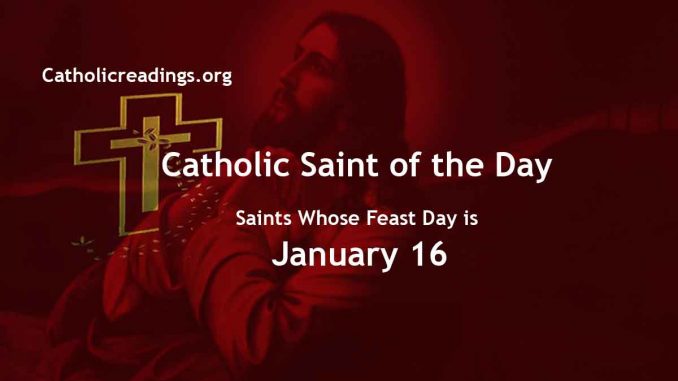This is the Saint of the Day list of Saints and Blesseds whose feast day is January 16 2025.
👉 Pope Saint Marcellus I
Saint Joseph Vaz
Blessed Gonzalo de Amarante
Blessed Giuseppe Antonio Tovini
Saint Fursey of Péronne
Blessed Juana Maria Condesa Lluch
Saint Honoratus of Arles
Saint Berardes of Morocco
Saint Titian of Oderzo
Blessed James of Luino
Saint Sigeberht of East Anglia
Saint Accursies of Morocco
Saint Dana of Leuca
Blessed Louis-Antoine-Rose Ormières Lacase
Saint Peter of Morocco
Saint Otto of Morocco
Blessed Joan of Bagno di Romagna
Saint Henry of Coquet
Blessed Konrad II of Mondsee
Saint James of Tarentaise
Saint James of Tarentaise was also known as Apostle of Savoy, James the Syrian, James the Assyrian, and Giacomo.
He was a Syrian soldier in the imperial Persian army. He later converted to Christianity and became a Monk.
He was at one time a spiritual student of Saint Honoratus at Lérins in France. Later on, he became a Missionary to the Savoy region and thereafter, in 426 AD, the First bishop of Moûtiers, France.
Throughout his life, he was known as a miracle worker. He died on January 16 429 AD in Arles, France.
Saint Honoratus of Fondi
Saint Honoratus of Fondi was a sixth-century benedictine monk. He was the founder and abbot of the monastery at Fondi, Southern Italy.
Pope Saint Gregory the Great wrote a brief biography of him. He was the patron of Fondi, Italy.
Saint Priscilla of Rome
Saint Priscilla of Rome was married to Manius Acilius Glabrio. She was the mother of Senator Pudens and supported Saint Peter the Apostle in his work in Rome, Italy. Her villa near the Roman catacombs served as Peter’s headquarters.
Saint Dunchaid O’Braoin
Saint Dunchaid O’Braoin was born in Westmeath, Ireland. He became a hermit and abbot of Clonmacnoise, near Westmeath, Ireland in 969.
In his last years, he retired from abbacy to resume the life of a hermit at Armagh, Ireland. He died in 988 AD in Armagh, Ireland of natural causes.
Saint Triverius
Saint Triverius also known as Trivier, Triviero or Troverio was born in Neustria, Gaul in modern France and was known as a spiritual child.
He became Hermit near the monastery of Thérouanne, and then at Dombes at a young age. The French village of Saint Trivier is named for him. He died in 550 AD of natural causes.
Saint Valerius of Sorrento
Saint Valerius of Sorrento was a hermit for many years near Sorrento, Italy. He became the reluctant bishop of Sorrento, chosen by the people of that city due to his wisdom and piety. He died in 453 AD of natural causes. He is the patron of Sorrento, Italy.
Saint Melas of Rhinocolura
Saint Melas of Rhinocolura was the bishop of Rhinocolura on the Mediterranean Sea, near the boundary between Egypt and Palestine. He was imprisoned and tortured by Arian heretics and died in 385 AD.
Saint Leobazio
Saint Leobazio also known as Leobato was a fifth-century monk. He was a spiritual student of Saint Urso and became abbot of Saint Orso Sénevière abbey in Lugdunense, Gaul in modern France.
Saint Liberata of Pavia
Saint Liberata of Pavia was born in Pavia, Italy. She was the sister of Saint Honorata and Saint Ephiphanius of Pavia and was a nun.
Other Saints of the Day for January 16 2025
- Adjute of Morocco

Powered By SEO Experts
Follow @ReadingCatholic
